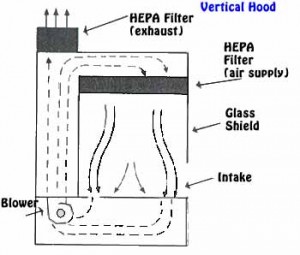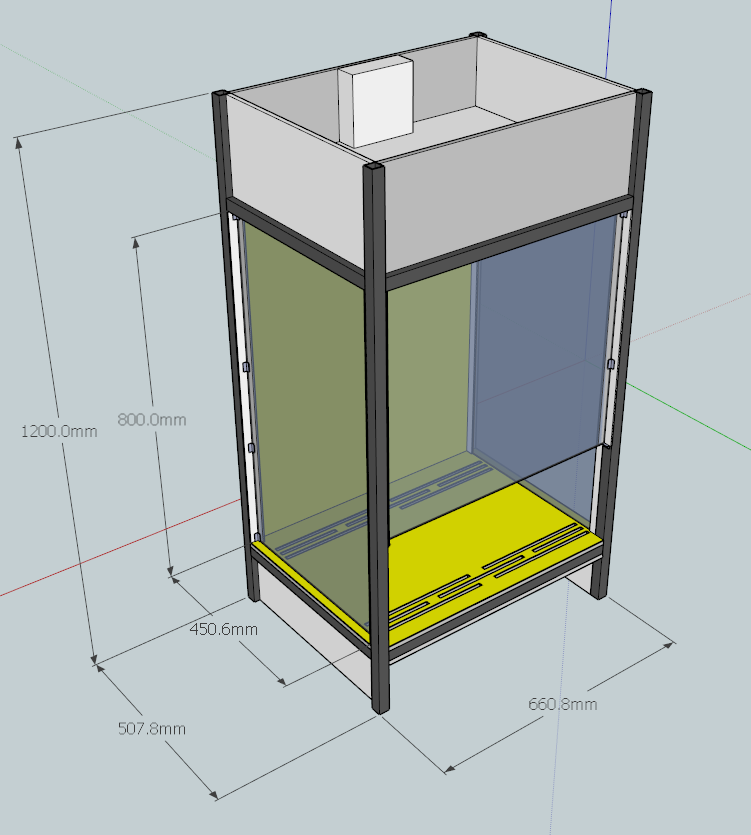Project:Flow Hood: Difference between revisions
No edit summary |
|||
| (14 intermediate revisions by 2 users not shown) | |||
| Line 10: | Line 10: | ||
[[File:Verticalhood.jpg]] | [[File:Verticalhood.jpg]] | ||
Proposed vertical hood design: | |||
[[File:VerticalhoodSketchup.png]] | |||
[https://www.dropbox.com/s/pbyrjrmhtqgbdi3/steel%20box%20section.skp SketchUp file of proposed design] | |||
== Construction and Materials == | == Construction and Materials == | ||
| Line 16: | Line 22: | ||
=== Work surface and side panels === | === Work surface and side panels === | ||
Because we will be using 70% ethanol for sterilisation, the materials used for the sides and work surface must be resistant to this. Unfortunately 70% ethanol kills perspex over time so | Because we will be using 70% ethanol for sterilisation, the materials used for the sides and work surface must be resistant to this. Unfortunately 70% ethanol kills perspex over time so we should use glass for the sides and a sheet of polypropylene for the work surface. | ||
=== Sealant === | === Sealant === | ||
The inside edges of the flow hood need to be sealed and air tight. As with the side panels, the sealant must be resistant to 70% ethanol, so ordinary bathroom sealant is out. So far the only ethanol resistant sealant I have found is [http://www.ppg.com/coatings/aerospace/sealants/indsealadh/Pages/default.aspx PRC Rapid Seal] which is rather expensive. A cheaper alternative that may work is simply sticking | The inside edges of the flow hood need to be sealed and air tight. As with the side panels, the sealant must be resistant to 70% ethanol, so ordinary bathroom sealant is out. So far the only ethanol resistant sealant I have found is [http://www.ppg.com/coatings/aerospace/sealants/indsealadh/Pages/default.aspx PRC Rapid Seal] which is rather expensive. A much cheaper alternative that may work is simply sticking PTFE tape along the edges. However the ethanol may work its way under the tape and cause the adhesive to loosen. | ||
=== Filters === | === Filters === | ||
HEPA rated filters will remove any bacteria and other contaminants from a flow of air. They are often used in air conditioners and air purifiers. The entire 'ceiling' of the flow hood must consist of filters, so the dimensions of worksurface of the hood are constrained by what size filters we can find for a reasonable price. So far [http://www.amazon.co.uk/Fellowes-Filter-Large-Purifier-9370101/dp/B0067D7D1S these filters on Amazon] appear to be our best option - we can put two next to each other to achieve a 64x42cm work surface. | HEPA rated filters will remove any bacteria and other contaminants from a flow of air. They are often used in air conditioners and air purifiers. The entire 'ceiling' of the flow hood must consist of filters, so the dimensions of worksurface of the hood are constrained by what size filters we can find for a reasonable price. <strike> So far [http://www.amazon.co.uk/Fellowes-Filter-Large-Purifier-9370101/dp/B0067D7D1S these filters on Amazon] appear to be our best option - we can put two next to each other to achieve a 64x42cm work surface. So far I have had no luck in getting the pressure drop information about the filters from Fellowes, an alternative is to use [https://secure.jfilters.com/v2/Store/Store.aspx?OptionID=10288&OptionItemID=11348&View=Filter this costlier filter (UMPW78132418)] from a company that will be able to provide detailed information </strike> | ||
After finally discovering the specs of the Fellowes filters, they're not appropriate. That means we need to opt for the [http://www.jasunfiltration.com/acatalog/Jasun_Envirocare_plc_Grade_H13_256.html UMPW78 18x24] ([http://jasunfiltration.com/acatalog/datasheets/umpw78.pdf spec sheet]). | |||
=== Blower/Fan === | === Blower/Fan === | ||
We need to find a blower that will blow the right amount of air through the filters to create laminar flow. Instructions on how to figure out the maths of achieving laminar flow through a HEPA filter can be found in [http://fradnai.free.fr/docs/doc23.pdf this helpful PDF]. | We need to find a blower that will blow the right amount of air through the filters to create laminar flow. Instructions on how to figure out the maths of achieving laminar flow through a HEPA filter can be found in [http://fradnai.free.fr/docs/doc23.pdf this helpful PDF]. | ||
In our case: | |||
To achieve 0.45m/s: airflow of 421m^3/h (248CFM) | |||
Filter pressure drop : 90Pa | |||
The [http://db.sanyodenki.co.jp/product_db_e/coolingfan/dcfan/dc_fan_detail.php?master_id=2527 Sanyo Denki 9GV1512H501] should be able to handle this though we may need to bump it to 13V or so. | |||
=== Shopping List === | |||
{| class="wikitable" | |||
!Item | |||
!Amount | |||
!Cost | |||
|- | |||
| [http://www.metals4u.co.uk/aluminium-angle/1-x-34-x-18/12/8697/detail.asp Aluminium Angle]<br/>1" x 3/4" x 1/8" || 5000mm || £14.00 | |||
|- | |||
| [http://www.metals4u.co.uk/aluminium-angle/38-x-38-x-116/12/8695/detail.asp Aluminium Angle]<br/>3/8" x 3/8" x 1/16" || 1000mm || £1.17 | |||
|- | |||
| [http://www.metals4u.co.uk/mild-steel-box-section/1-x-1-x-14swg-mild-steel-box/49/2383/detail.asp Mild Steel Box]<br/>1" x 1" x 14swg || 2x6000mm || £39.70 | |||
|- | |||
| [http://www.directplasticsonline.co.uk/PolypropyleneSheet/1mm/ Polypropylene Sheet]<br/>1000 x 500 x 1mm || 1 || £4.85 | |||
|- | |||
| [http://www.directplasticsonline.co.uk/PolypropyleneSheet/1mm/ Polypropylene Sheet]<br/>1000 x 1000 x 1mm || 1 || £9.24 | |||
|- | |||
| [http://www.jasunfiltration.com/acatalog/Jasun_Envirocare_plc_Grade_H13_256.html Ultima MPW78 18x24] || 1 || £100.00 | |||
|- | |||
| Glass<br/>450 x 800 x 3mm || 2 || £... | |||
|- | |||
| Glass<br/>603 x 550 x 3mm || 1 || £... | |||
|- | |||
| [http://uk.mouser.com/ProductDetail/Sanyo-Denki/9GV1512H501/?qs=sGAEpiMZZMtmglTKXDHoWiEX1mLPmXqu1%252bkk5Gft5iQ%3d Sanyo-Denki 9GV1512H501] || 1 || £26.25 | |||
|} | |||
== Links == | |||
[http://myco-tek.org/showthread.php?49-EvilMushroom666-s-Flowhood-Build http://myco-tek.org/showthread.php?49-EvilMushroom666-s-Flowhood-Build] | |||
[http://edgeqld.org.au/catalyst/2013/01/03/diy-laminar-flow-hood/ http://edgeqld.org.au/catalyst/2013/01/03/diy-laminar-flow-hood/] | |||
[[Category:Biohacking]] | |||
Latest revision as of 10:17, 10 August 2014
Overview
A Laminar Flow Hood would enable us to greatly improve the aseptic technique protocol in the hackspace. But first we need to make one.
Basic design
We should aim to build a vertical flow hood as that not only protects cultures from contamination but protects the user from the cultures being worked on.
Here is a basic diagram of what it should look like.
Proposed vertical hood design:
SketchUp file of proposed design
Construction and Materials
Frame
We need to construct a frame: perhaps weld together some steel box section; or chop up and repurpose an old shelving unit; or construct it out of makerbeam, openbeam or easy fix.
Work surface and side panels
Because we will be using 70% ethanol for sterilisation, the materials used for the sides and work surface must be resistant to this. Unfortunately 70% ethanol kills perspex over time so we should use glass for the sides and a sheet of polypropylene for the work surface.
Sealant
The inside edges of the flow hood need to be sealed and air tight. As with the side panels, the sealant must be resistant to 70% ethanol, so ordinary bathroom sealant is out. So far the only ethanol resistant sealant I have found is PRC Rapid Seal which is rather expensive. A much cheaper alternative that may work is simply sticking PTFE tape along the edges. However the ethanol may work its way under the tape and cause the adhesive to loosen.
Filters
HEPA rated filters will remove any bacteria and other contaminants from a flow of air. They are often used in air conditioners and air purifiers. The entire 'ceiling' of the flow hood must consist of filters, so the dimensions of worksurface of the hood are constrained by what size filters we can find for a reasonable price. So far these filters on Amazon appear to be our best option - we can put two next to each other to achieve a 64x42cm work surface. So far I have had no luck in getting the pressure drop information about the filters from Fellowes, an alternative is to use this costlier filter (UMPW78132418) from a company that will be able to provide detailed information
After finally discovering the specs of the Fellowes filters, they're not appropriate. That means we need to opt for the UMPW78 18x24 (spec sheet).
Blower/Fan
We need to find a blower that will blow the right amount of air through the filters to create laminar flow. Instructions on how to figure out the maths of achieving laminar flow through a HEPA filter can be found in this helpful PDF.
In our case:
To achieve 0.45m/s: airflow of 421m^3/h (248CFM) Filter pressure drop : 90Pa
The Sanyo Denki 9GV1512H501 should be able to handle this though we may need to bump it to 13V or so.
Shopping List
| Item | Amount | Cost |
|---|---|---|
| Aluminium Angle 1" x 3/4" x 1/8" |
5000mm | £14.00 |
| Aluminium Angle 3/8" x 3/8" x 1/16" |
1000mm | £1.17 |
| Mild Steel Box 1" x 1" x 14swg |
2x6000mm | £39.70 |
| Polypropylene Sheet 1000 x 500 x 1mm |
1 | £4.85 |
| Polypropylene Sheet 1000 x 1000 x 1mm |
1 | £9.24 |
| Ultima MPW78 18x24 | 1 | £100.00 |
| Glass 450 x 800 x 3mm |
2 | £... |
| Glass 603 x 550 x 3mm |
1 | £... |
| Sanyo-Denki 9GV1512H501 | 1 | £26.25 |
Links
http://myco-tek.org/showthread.php?49-EvilMushroom666-s-Flowhood-Build
http://edgeqld.org.au/catalyst/2013/01/03/diy-laminar-flow-hood/

